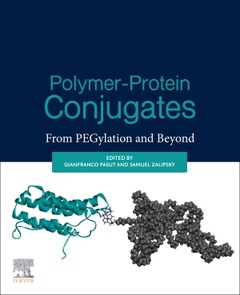Polymer-Protein Conjugates From Pegylation and Beyond
Coordonnateurs : Pasut Gianfranco, Zalipsky Samuel

Polymer?Protein Conjugates: From Pegylation and Beyond helps researchers by offering a unique reference and guide into this fascinating area. Sections cover the challenges surrounding the homogeneity of conjugates, their purity and polymer toxicity on long-term use, and how to deal with the risk of immunogenicity. These discussions help researchers design new projects by taking into account the latest innovations for safe and site selective polymer conjugation to proteins. PEG has been the gold standard and likely will play this role for many years, but alternatives are coming into the market, some of which have already been launched.
After five decades of improvements, the ideas in this book are entering into a new era of innovation because of the advances in genetic engineering, biochemistry and a better understanding of the results from clinical use of PEG conjugates in humans.
Introduction and General Aspects of the Technology 1. Evolution of Polymer Conjugation to proteins 2. PEGylated Proteins: A Rational Design for Mitigating Clearance Mechanisms and Altering Biodistribution 3. Overcoming barriers for tumor-targeted drug delivery: the power of macromolecular anticancer drugs with the EPR effect and the modulation of vascular physiology
Toxicity and Immunogenicity Studies and Clinical Stage Conjugate Products 4. PEG-protein conjugates: Non-clinical and clinical toxicity considerations 5. Immunological responses to PEGylated proteins: anti-PEG antibodies 6. Immunogenicity assessment of PEGylated proteins, Lonquex, a PEGylated G-CSF case study 7. PEG-Protein conjugates: regulatory requirements for characterization 8. PEGylation of human coagulation factor VIII and other plasma proteins 9. Pegvorhyaluronidase Alfa: A PEGylated Recombinant Human Hyaluronidase PH20 for the Treatment of Cancers That Accumulate Hyaluronan 10. Challenges in the analytical characterization of PEGylated asparaginases
Novel Site-Selective Methods of Conjugation 11. Glycan-targeted PEGylation for selective modification of proteins 12. Sialyltransferase mediated glycoPEGylation 13. Enzymatic approaches to new protein conjugates 14. Site-specific Polymer-protein conjugates by Cys mutation 15. Site-specific PEGylation of interferon beta-1b: from bench to clinic 16. Protein modification by bis-alkylation
Alternative non-PEG polymers and architectures 17. In vivo properties of therapeutic bioconjugates composed of proteins and architecturally/functionally complex polymers 18. Poly(2-oxazoline)-protein conjugates 19. Polysaccharides for protein and peptide conjugation 20. Polysialylation of human coagulation factor VIII
Graduate students and advanced researchers from academic/industrial background who are interested in protein modification and delivery. The potential users can be a pharmacologist, who want insight on this technology regarding approved product, as well as a biochemical engineer who wants learn how to design the future protein conjugates. Probably a chemist would be less involved although chemistry is at the basis of most successful conjugates. Patent attorney, PEGylation is described in many patents.
Samuel Zalipsky, Ph.D. is currently an independent consultant in the areas of carrier mediated drug delivery, nanoparticles, biocompatible polymers, liposomes, preparation and applications of a wide spectrum of bioconjugates, and PEGylated biopharmaceuticals in particular. His professional tenure of over 30 years was spent mainly in pharmaceutical industry, contributing to several commercialized technologies and products. He is an author of over 90 publications and listed as an inventor on over 50 patents.
- Provides an overview on the state-of-the-art of protein polymer conjugation
- Presents both the pros and cons of polymer-protein conjugates from the point-of-view of their clinical outcomes
- Outlines advantages and potential risks of present technology based on PEG
- Offers new alternatives for PEG and new approaches for on site-selective protein modification
- Identifies future direction of research in this field
Date de parution : 10-2019
Ouvrage de 512 p.
19x23.3 cm
Thème de Polymer-Protein Conjugates :
Mots-clés :
Polymer conjugation; PEGylation; protein therapeutic; protein delivery; drug delivery



